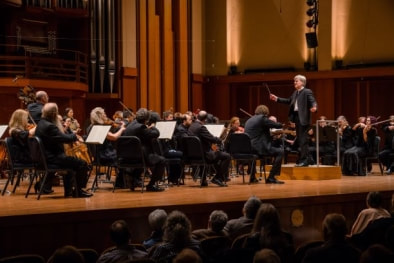Read one MD's perspective here.
|
Can the music you listen to boost your immune system? The answer seems to be yes!
Read one MD's perspective here.
4 Comments
The Cleveland Orchestra is expanding how it engages and connects with music lovers with a new weekly podcast series available now. On a Personal Note will offer uniquely personal perspectives and illuminating views from inside classical music, speaking directly about Cleveland Orchestra concert recordings. This season of On a Personal Note will feature ten episodes. The first and second episodes are now available on the Cleveland Orchestra web site, and across all major podcast platforms.
The premiere, titled The Sound of Crisis, focuses on the extraordinary and moving circumstances of The Cleveland Orchestra’s last performance together. On the morning of Friday, March 13, the Orchestra gathered onstage at Severance Hall for a final time. Music Director Franz Welser-Möst led a performance of Schubert’s “Great” Symphony in C major (D.944) to a nearly empty concert hall; only a few staff members witnessed what was originally scheduled as a public concert. In the podcast, Welser-Möst recalls his conflicting emotions conducting the Orchestra in such an unusual situation— and without knowing when the musicians might make music together again. This performance was recorded under the first phase of restrictions put in place by the Governor of Ohio, limiting a total of no more than 100 people being together in an enclosed space. Additional restrictions were implemented in subsequent weeks, making the March 13 performances the last time The Cleveland Orchestra has been able to play together since then. “Every story has a soundtrack, and every soundtrack has a story,” says André Gremillet, Cleveland Orchestra President & CEO. “In this new series, Cleveland Orchestra Music Director Franz Welser-Möst and individual musicians in the Orchestra share personally meaningful stories about moments when music has shaped their lives — providing listeners with behind-the-scenes insight and a chance to turn their focus away from daily challenges. “In development across the past year, On a Personal Note podcasts are designed to showcase incredibly personal and, at times, raw stories about the impact of music, pairing artist interviews with selections from the Orchestra’s best concert recordings." Episode Summaries The Sound of Crisis (available now) Music Director Franz Welser-Möst recalls his conflicting emotions conducting The Cleveland Orchestra one last time before the coronavirus pandemic silenced Severance Hall. The Lasting Luster of Vinyl (available now) French Horn player Rich King shares his earliest memories of hearing Beethoven’s heroic Third Symphony on the family phonograph and how the disc ended up shaping his destiny. A Romance with Rosenkavalier Violinist Katherine Bormann contemplates whether you can be in a long-term relationship with a composition and talks about why she’ll stick with Strauss's Rosenkavalier Suite until the end. First Impressions At age 21, in his second week with The Cleveland Orchestra, Principal Horn Nathaniel Silberschlag played Mahler’s 5th for a packed house—and defied expectations. Even his own. These podcasts and more about the Cleveland Orchestra can be found here. As many of us are spending a lot of time at home, pianist Orli Shaham shares a special treat: a sneak preview of a track from her forthcoming album of Mozart piano sonatas. Orli Shaham's "MidWeek Mozart" gives you exclusive access to a different movement of a Mozart piano sonata. Each episode is available for a week.
You'll find Orli's Mozart offerings here. (This is courtesy of a press release from Baylor University, but I found it interesting.) College students who listened to classical music by Beethoven and Chopin during a computer-interactive lecture on microeconomics — and heard the music again that night — did better on a test the next day than did peers who were in the same lecture, but instead slept that evening with white noise in the background. Over the long haul — when students took a similar test nine months later — the boost did not last. Scores dropped to floor levels, with everyone failing and performance averaging less than 25% percent for both groups. However, targeted memory reactivation (TMR) may aid during deep sleep, when memories are theorized to be reactivated and moved from temporary storage in one part of the brain to more permanent storage in other parts, researchers said. The study, supported by the National Science Foundation and conducted by Baylor’s Sleep Neuroscience and Cognition Laboratory (SNAC), is published in the journal Neurobiology of Learning and Memory. “All educators want to teach students how to integrate concepts, not just memorize details, but that’s notoriously difficult to do,” said Michael K. Scullin, Ph.D., director of Baylor’s sleep lab and assistant professor of psychology and neuroscience. “What we found was that by experimentally priming these concepts during sleep, we increased performance on integration questions by 18% on the test the next day. What student wouldn’t want a boost or two to their letter grade? The effects were particularly enhanced in participants who showed heightened frontal lobe activity in the brain during slow wave sleep, which is deep sleep.” He noted that the effects emerged when using gold standard procedures: neither participants nor experimenters knew who received a particular treatment, sleep was measured using EEG in a laboratory setting, and the learning materials matched those that would actually be used in a college classroom, in this case an undergraduate microeconomics lecture. Poor sleep is widespread in college students, with 60 percent habitually sleeping fewer than the recommended seven hours on 50 to 65 percent of nights. While students may be more concerned about immediate test results — and TMR may help them cram for an exam — learning by rote (item memory) does not normally benefit grasping and retaining a concept. For the study, researchers recruited 50 college students ages 18 to 33 for a learning task with a self-paced, computer-interactive lecture; and for two overnight polysomnography sessions, with the first night an adaptation to the lab and screening for sleep disorders, and the second done the evening of the lecture. During the lecture, soft background selections were played from a computer: the first movement of Beethoven's “Moonlight” Piano Sonata, the first movement of Vivaldi's “Spring” Violin Concerto and Chopin's Nocturne in E-flat major, Op. 9, No. 2. That night in Baylor’s sleep lab, research personnel applied electrodes and used computers to monitor sleep patterns of both test and control groups. Once technicians observed a person was in deep sleep, they played either the classical music or the white noise — depending on whether the individual was in the test or control group — for about 15 minutes. “Deep slow wave sleep won’t last super long before shifting back to light sleep, so we couldn’t play them endlessly,” Scullin said. “If we played it during light sleep, the music probably would have awoken participants. The first slow wave cycle is the deepest and longest.” The music choice was important, researchers said. “We ruled out jazz because it’s too sporadic and would probably cause people to wake,” Scullin said. “We ruled out popular music because lyrical music disrupts initial studying. You can’t read words and sing lyrics — just try it. We also ruled out ocean waves and ambient music because it’s very easy to ignore. You’re going to have a heck of a time forming a strong association between some learning material and a bland song or ambient noise. “That left us with classical music, which many students already listen to while studying,” he said. “The songs can be very distinctive and therefore pair well with learning material.” In the microeconomics exam the next day, the TMR of classical music more than doubled the likelihood of passing the test when compared with the control condition of white noise. Scullin cautioned against confusing the Baylor study’s findings with the so-called “Mozart Effect” — the finding that having students listen to Mozart pieces led to better scores on intelligence tests. Subsequent tests of the “Mozart Effect” found that it either did not replicate or that boosts were strictly due to increased arousal when listening to energetic music. “Mozart doesn’t make memories,” Scullin said. Previous researchers have found that memories associated with sensory cues — such as an odor or song — are re-activated when the same cue is received later. When that happens during deep sleep, the corresponding memories are activated and strengthened, said co-researcher Chenlu Gao, a doctoral candidate of psychology and neuroscience at Baylor. Early experimenters also played audio tapes during sleep to test whether individuals can learn new knowledge while sleeping. But while those experiments failed to create new memories, “our study suggests it is possible to reactivate and strengthen existing memories of lecture materials during sleep,” Gao said. “Our next step is to implement this technique in classrooms — or in online lectures while students complete their education at home due to COVID-19 social distancing measures — so we can help college students ‘re-study’ their class materials during sleep.” “We think it is possible there could be long-term benefits of using TMR but that you might have to repeat the music across multiple nights,” Scullin added. “After all, you wouldn’t just study material a single time and then expect to remember it months later for a final exam. The best learning is repeated at spaced-out intervals — and, of course, while maintaining good sleep habits.” .As COVID-19 has reached pandemic proportions, I know that all of our hearts go out to every musician who has lost all or most of their income as performances and events have suddenly been cancelled for the foreseeable future. We’re hearing from many artists grappling with so much uncertainty about what lies ahead. In the face of this unprecedented challenge, some creative folks have come up with a way to help.
There will be a virtual benefit concert this Saturday, April 4, beginning at 8 p.m. Eastern/5 p.m. Pacific. Streaming live from their homes, pianists Emanuel Ax and Jon Kimura Parker, mezzo-soprano J’Nai Bridges, violinist Rachel Barton Pine, clarinetist Anthony McGill, harpist Bridget Kibbey, and others will give an intimate view into some of their favorite pieces. The artists are all generously donating their time and all proceeds will go to the Artist Relief Tree a new fund created to financially support artists who are affected by cancellations due to COVID-19. Tickets are available by clicking here Contributions begin at $5 and viewers are encouraged to give as much as they feel comfortable. |
AuthorI'm a classical radio announcer, blogger, and musician. Archives
April 2022
Categories |


 RSS Feed
RSS Feed
